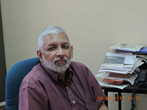On the existence of a non-principal Euclidean ideal class in biquadratic fields with class number two
Speaker: Mr. Sunil Kumar Pasupulati , IISER Thiruvananthapuram
Abstract: In 1979, Lenstra introduced the definition of the Euclidean ideal which is a generalization
of Euclidean domain.
Definition 1. Let R be a Dedekind domain and \mathbb{E} be the set of non zero integral ideals
of R. If C is an ideal of R, then it is called Euclidean if there exists a function \psi : \mathbb{E} → \mathbb{N} ,
such that for every I \in \mathbb{E} and x \in I^{-1}C \ C there exist a y \in C such that
\psi ((x - y)IC^{-1}) < \psi(I)
H.Graves constructed an explicit biquadratic field
\mathbb{Q}(\sqrt{2}, \sqrt{35}) which has a non-principal
Euclidean ideal class. C. Hsu generalized the result by Graves and proved suppose
K = \mathbb{Q}(\sqrt{q}, \sqrt{kr}) ,then
K has a non-principal Euclidean ideal class whenever
h_K = 2.
Here the integers q, k, r are all primes ≥ 29 and are all congruent to 1 modulo 4. The family
of biquadratic field given by C. Hsu is extended by Chattopadhyay and Muthukrishnan
and proved that, If
K = \mathbb{Q}(\sqrt{q}, \sqrt{kr}), where
q ≡ 3 and
k, r ≡ 1 (mod 4) are prime
numbers. Suppose that
h_K = 2. Then K has a Euclidean ideal class.
In this talk, I will prove that a new family of biquadratic fields having non principal
Euclidean ideal class whenever the class number of biquadratic field equal to two. This is
joint work with Srilakshmi Krishnamoorthy.



















